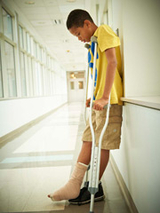
An international survey — conducted with over 2,600 hospital emergency department staff in more than 80 countries — found gaps in knowledge and confidence about providing psychosocial care for injured children. Nearly all the respondents (93 percent) desired training in this area, including further education on child traumatic stress and how to provide emotional support to injured children.
The report was published today in The Journal of Pediatrics.
Among the millions of children who sustain injuries requiring hospital care, about one in six go on to develop persistent stress symptoms. These may include nightmares, concentration difficulties, and negative thoughts. While survey respondents recognized the importance of dealing with the psychological impact of child injury — more than 90 percent saw this as part of their job — very few (only 14 percent) felt confident about educating children and families about traumatic stress reactions. The survey also revealed some common misunderstandings about child traumatic stress that might impact ED care:
- Only half of respondents knew toddlers can develop traumatic stress symptoms.
- About 40 percent recognized that children who behave calmly in the ED could still develop persistent stress reactions after their visit.
According to Nancy Kassam-Adams, PhD, from The Children's Hospital of Philadelphia, one of the study’s authors, “There is very good news here about health care professionals’ strong commitment to the best care for injured children and their interest in learning more to improve psychosocial aspects of this care.”
Visit the Center for Pediatric Traumatic Stress to learn more about improving psychosocial care for ill and injured children.
Learn more about post-injury care and recovery research at the Center for Injury Research and Prevention (CIRP).

An international survey — conducted with over 2,600 hospital emergency department staff in more than 80 countries — found gaps in knowledge and confidence about providing psychosocial care for injured children. Nearly all the respondents (93 percent) desired training in this area, including further education on child traumatic stress and how to provide emotional support to injured children.
The report was published today in The Journal of Pediatrics.
Among the millions of children who sustain injuries requiring hospital care, about one in six go on to develop persistent stress symptoms. These may include nightmares, concentration difficulties, and negative thoughts. While survey respondents recognized the importance of dealing with the psychological impact of child injury — more than 90 percent saw this as part of their job — very few (only 14 percent) felt confident about educating children and families about traumatic stress reactions. The survey also revealed some common misunderstandings about child traumatic stress that might impact ED care:
- Only half of respondents knew toddlers can develop traumatic stress symptoms.
- About 40 percent recognized that children who behave calmly in the ED could still develop persistent stress reactions after their visit.
According to Nancy Kassam-Adams, PhD, from The Children's Hospital of Philadelphia, one of the study’s authors, “There is very good news here about health care professionals’ strong commitment to the best care for injured children and their interest in learning more to improve psychosocial aspects of this care.”
Visit the Center for Pediatric Traumatic Stress to learn more about improving psychosocial care for ill and injured children.
Learn more about post-injury care and recovery research at the Center for Injury Research and Prevention (CIRP).